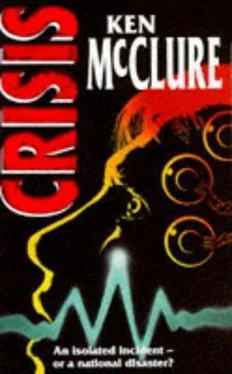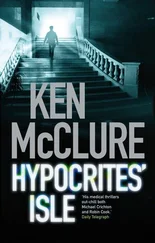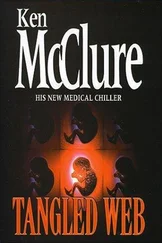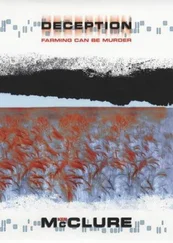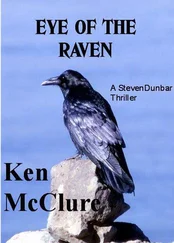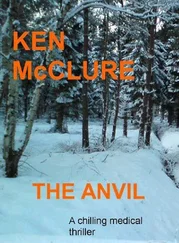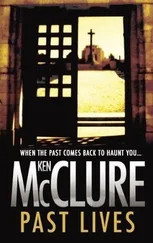Ken McClure - Crisis
Здесь есть возможность читать онлайн «Ken McClure - Crisis» весь текст электронной книги совершенно бесплатно (целиком полную версию без сокращений). В некоторых случаях можно слушать аудио, скачать через торрент в формате fb2 и присутствует краткое содержание. Жанр: Триллер, на английском языке. Описание произведения, (предисловие) а так же отзывы посетителей доступны на портале библиотеки ЛибКат.
- Название:Crisis
- Автор:
- Жанр:
- Год:неизвестен
- ISBN:нет данных
- Рейтинг книги:3 / 5. Голосов: 1
-
Избранное:Добавить в избранное
- Отзывы:
-
Ваша оценка:
- 60
- 1
- 2
- 3
- 4
- 5
Crisis: краткое содержание, описание и аннотация
Предлагаем к чтению аннотацию, описание, краткое содержание или предисловие (зависит от того, что написал сам автор книги «Crisis»). Если вы не нашли необходимую информацию о книге — напишите в комментариях, мы постараемся отыскать её.
Crisis — читать онлайн бесплатно полную книгу (весь текст) целиком
Ниже представлен текст книги, разбитый по страницам. Система сохранения места последней прочитанной страницы, позволяет с удобством читать онлайн бесплатно книгу «Crisis», без необходимости каждый раз заново искать на чём Вы остановились. Поставьте закладку, и сможете в любой момент перейти на страницу, на которой закончили чтение.
Интервал:
Закладка:
‘So there wasn’t a species barrier at all?’
‘No.’
‘Ye gods,’ said Lark. ‘But surely Scrapie couldn’t cross to humans?’
Flowers held up a sheaf of papers in his hand and said, This case suggests otherwise.’
1 have always maintained that Scrapie in sheep should have been made notifiable all along, just like BSE,’ said Munro.
‘Well, if s too late to bolt that particular stable door,’ said Flowers. ‘Our problem is that not only can we not allay the government’s fears about an increasing incidence of brain disease but we have to inform them of the existence of a potential disaster in the making.’
‘I take it lambs can be affected with the disease too?’ asked Lark.
‘Yes,’ said Munro, ‘and to answer your next question, roasting would not kill the agent. It’s one of the toughest viruses on earth. It can withstand the temperature achieved in a hospital steam sterilizer.’
‘Then I hope to God that the report is mistaken,’ said Lark.
‘Who is reporting for the Scottish region?’ asked Munro.
‘George Stoddart.’
‘Edinburgh University?’
Flowers nodded.
‘Have you spoken to him?’ asked Lark.
‘Yes,’ said Flowers.
‘And?’
‘Stoddart says that his man is adamant that the men died of Scrapie but there will be the usual difficulty in assigning the cause.’
‘I’m not sure I understand,’ said Lark. ‘What difficulty?’
Flowers looked to Munro and said, ‘You’re the expert in this field. Perhaps you would explain.’
‘Of course,’ said Munro, clearing his throat. ‘We know very little about the infecting agent which causes Scrapie in sheep or BSE in cattle for that matter. The only reliable way of demonstrating the infection is by injection of infected material from one animal into another. In this way we can show that the agent is transmissible and has a similar pathology.’
‘What sort of infected material?’ asked Lark.
‘The standard test is for macerated brain obtained at autopsy to be injected into mice to see if they develop degenerative brain disease.’
‘Has such a disease ever been seen in man?’ asked Lark.
‘Yes,’ replied Munro. ‘In man it’s called Creutzfeld Jakob Disease. It’s a brain disease of the old. It’s a relatively rare condition and thankfully it has a very long incubation period.’
‘What was the incubation period in this case?’ asked Munro.
All eyes turned towards Flowers. ‘Stoddart says that his man reports that the patients developed the disease almost overnight and were dead within three weeks. The brain pathology was identical to Scrapie or Creutzfeld Jakob Disease. They’re practically indistinguishable in terms of histopathology.’
‘Damnation,’ said Lark. ‘Three is not a big number. I still feel we may be jumping to conclusions.’
‘I’d like to agree,’ said Flowers, ‘but three men working on a farm with infected sheep die of a brain disease indistinguishable from Scrapie? We have to take this seriously.’
This comment was digested for a moment in silence then Lark said, ‘It’s still very hard to believe that a sheep disease that’s been around for years without causing the slightest trouble in man has suddenly managed to jump the species barrier and start killing people.
‘Surely there would have to have been some additional factor involved; a change to the infecting agent; a mutation of some sort; an alteration, either spontaneous or induced.’
‘Let’s hope, if that’s the case, that the mutation was induced by some local factor and that this is an isolated incident,’ said Flowers.
Then it’s of the utmost importance to establish just what caused the mutation,’ said Munro.
‘Agreed.’
‘Are there any clues?’ asked Lark.
There is one prime suspect,’ said Flowers.
‘What’s that?’ asked Munro.
The area around the farm in question includes the Invermaddoch nuclear power station.’
‘Radiation,’ said Lark.
‘What better inducer of mutation?’
‘1 need hardly tell you what a delicate position this business puts us in,’ said Munro. ‘If we suddenly announce that a highland region is reporting that people living in the vicinity of a nuclear power station are developing an infectious brain disease which resembles sheep Scrapie in every way, we can expect a storm of panic and protest. Apart from public outcry, we will face the combined pressure of the agricultural lobby insisting that there is no link between infected animals and human brain disease, and the nuclear lobby maintaining that atomic energy is safe and clean.’
‘So what do we do?’ asked Munro. ‘And what do we tell Her Majesty’s Government?’
‘I think we have to treat the Scottish thing as a separate, isolated problem for the moment,’ said Lark. ‘In broad, general terms there is still no evidence that animal brain disease can be transmitted to man. I think we should admit that there has been an increase in reported cases of brain disease in the population but it is too early to assign a cause or say whether it is significant or not. Let the government’s statisticians present the figures in whatever way they want.’
‘But the government must be made aware of the potential problem in Scotland just in case it leaks out in the press,’ said Munro.
The area doesn’t get much attention from the press so we should be able to investigate quietly on our own for a while,’ said Flowers.
‘No disrespect to Stoddart and his people but I think we should see the pathology evidence taken from the three men who died,’ said Lark.
‘I’ve asked for it,’ said Flowers.
‘Did Stoddart say who the investigator on the ground was?’ asked Munro.
‘Yes he did,’ replied Flowers, referring to his notes. ‘A pathologist named Dr Lawrence Gill.’
ONE
Dr Ian Bannerman sorted his notes before him on the lectern and waited for the hubbub to die down. He thought his audience of medical students looked depressingly familiar but quickly reminded himself that this was a cynical thought. Sometimes the borders between cynicism and realism were a bit fuzzy.
Despite a solid middle-class background with its attendant adherence to Christian ethics and values he had always failed to be convinced that human beings were ‘individuals in their own right’. People, as he saw it, fell into certain discreet ‘types’. There was a type of person who became a vicar, a soldier, a policeman and so on. From lecturing to medical students for the last five years at St Luke’s Hospital he had come to recognise that there was a definite type of person who became a medical student.
Medicine was seen by society as a profession for winners and because of this medical schools could demand the very highest academic entry standards. This meant that the cleverest pupils on paper were encouraged to ‘try for medicine’ as if entering a competition to prove their worth. Egged on by parents and teachers alike, such people would often find themselves railroaded into something they had not given much thought to.
Equipped with a brand new stethoscope from proud parents and a dissecting set from Aunt Mabel they would turn up at St Luke’s, ready to start passing more exams because that was what they were good at. ‘Doesn’t anyone ask the buggers if they care about sick people?’ Bannerman had asked at the last faculty meeting. The remark had been met with good humoured tolerance. This did not please Bannerman; it only confirmed his thesis on people ‘types’. He reluctantly acknowledged that he was seen as the rough-diamond type; the kind of man who spoke his mind but was accepted because he was good at his job, and when it came to pathology there was none better.
Читать дальшеИнтервал:
Закладка:
Похожие книги на «Crisis»
Представляем Вашему вниманию похожие книги на «Crisis» списком для выбора. Мы отобрали схожую по названию и смыслу литературу в надежде предоставить читателям больше вариантов отыскать новые, интересные, ещё непрочитанные произведения.
Обсуждение, отзывы о книге «Crisis» и просто собственные мнения читателей. Оставьте ваши комментарии, напишите, что Вы думаете о произведении, его смысле или главных героях. Укажите что конкретно понравилось, а что нет, и почему Вы так считаете.
